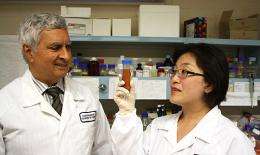(L-R) Professor Basil Roufogalis and Min Song with goji berry extract.
(Medical Xpress) -- The ancient Tibetan goji berry could help fight blindness caused by long-term diabetes according to studies conducted by University of Sydney researchers.
Faculty of Pharmacy researchers have conducted in vitro tests investigating the potential power of the berry which is now a popular natural remedy.
According to lead researcher, University of Sydney Professor of Pharmaceutical Chemistry Basil Roufogalis, the goji berry is abundant in taurine, an ingredient credited with anti-oxidative, anti-inflammatory and immuno-modulating properties which could protect the retina.
"Diabetic retinopathy is a leading cause of blindness for people with diabetes, with up to 60 percent of people living with either type 1 or type 2 diabetes developing chronic hyperglycaemia, a condition which can damage retina cells," explains Professor Roufogalis.
"Typically what happens is proteins in the eye become oxidated and high glucose levels force retinal cells to die.
"What's more, blood vessels build up in the retina and grow over the vision spot, which can result in vision loss."
The pharmacy researchers initially undertook work showing the goji berry and its taurine component activated a nuclear receptor protein called PPAR-gamma. This protein plays a crucial role in regulating the retinal cells. This paved the way for further investigation of Lycium barbarum (goji) and its potential to activate the PPAR-gamma receptor.
"First we looked at the protective effect of pure taurine, and an extract of goji berry rich in taurine, in retinal barrier epithelial cells exposed to high glucose - a cell line that can serve as a model to emulate diabetic retinopathy," said Professor Roufogalis.
"We found that goji berry protected against the death of cells caused by high concentrations of glucose in the retina. This protection occurred in parallel with the activation by the extract of the receptor protein (PPAR-gamma). The pure taurine found in the extract mimicked the effects of the goji berry extract.
"We then wanted to see whether the same extracts of goji berry and its pure taurine had an effect on protecting the retinal barrier against toxin invasion when the barrier is typically damaged by high glucose in diabetes patients.
"What we found is that both the pure taurine and the taurine-laden goji berry extract protected the retina against increased permeability of the protective barrier through its actions on the PPAR-gamma receptor, thereby helping the epithelial cells that provide the protective barrier to the retina.
"We are hopeful that these promising results for treating or preventing diabetic retinopathy will lead to human clinical trials," said Professor Roufogalis.
Min Song, also from the Faculty of Pharmacy, received a National Institute of Complementary Medicine (NICM) PhD scholarship to assist in the groundbreaking research. NICM, hosted by the University of Western Sydney, was launched in 2007 to facilitate strategic research in complementary medicine in Australia.
Professor Alan Bensoussan, director of NICM, hailed the novel research. "This is pioneering scientific research in the field of herbal medicine, and is to be applauded for investigating novel ways to address the debilitating effects of diabetes, which is such a pressing global health problem," he said.
Provided by University of Sydney




















